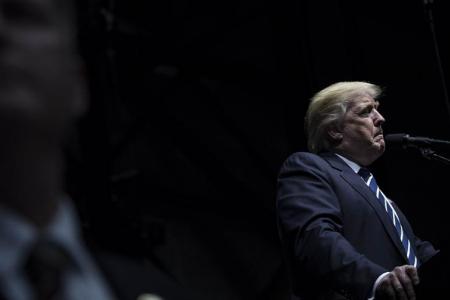Trump's immigration headache
As president, he will face limitations over moves to deport illegals and keep out asylum seekers
Abdullah is from what United States President-elect Donald Trump calls a "terror prone-region".
The young Iraqi went to the US on a student visa four years ago. If he returns, he will be expected to fight in a Shi'ite militia group.
Not surprisingly, he hopes the US will grant him asylum.
But he falls under a category of people Mr Trump has promised to clear out of the country.
Mr Trump has pledged he will suspend immigration from "all terror prone-regions where vetting cannot safely occur" and that "all vetting of people coming into our country will be considered 'extreme vetting'".
But he might find it harder than expected to keep to that.
When he is sworn into office on Jan 20, he will confront a number of practical limitations that will hinder his ability both to keep out asylum seekers and to deport those already in the country while they wait for their cases to be decided.
Mr Trump vowed to make Mexico pay for the wall, a plan Mexico has repeatedly rejected.
When it comes to determining how many refugees will be admitted into the US, the president has considerable power.
He ultimately decides alone how many people can legally resettle in the country.
President Barack Obama established that number to be 110,000 for next year, which Mr Trump will likely lower.
He can follow through with his proposed "Muslim ban". He can set the number of people escaping Syria, Afghanistan, Iraq, and Yemen very low or to zero.
But it would likely have disastrous policy consequences.
It would hurt regional alliances with countries such as Turkey, which is helping the US fight Islamic State in Iraq and Syria.
One of Mr Trump's boldest campaign proposals - to "keep illegals out" by building a wall at the Mexican border - will also face major obstacles.
Mr Trump vowed to make Mexico pay for the wall, a plan Mexico has repeatedly rejected.
BORDER CONTROL
If he cannot build the wall, he can tighten controls at the southern US border in other subtler ways.
But many people who enter illegally through Mexico are fleeing violence in Central America and are seeking asylum.
The US cannot send back people who have a fear of returning to their home countries - they are permitted to a credible fear interview with an asylum officer, which is a first step to starting the asylum process.
Deporting people already in the country legally will be much more difficult.
Both refugees and asylum seekers have a constitutional right to due process of law.
Refugees already in the country qualify for protection under US law based on the country's ratification of international treaties.
As president, Mr Trump will not be able to back out of these legal obligations without congressional approval.
It is unlikely that even Republican legislators will support changing US humanitarian laws, if only because doing so might cause other countries to follow suit, creating chaos and weakening international cooperation. - Reuters
Lolita Brayman is a US-based writer and immigration attorney, focusing of refugee and asylum issues.
Get The New Paper on your phone with the free TNP app. Download from the Apple App Store or Google Play Store now



